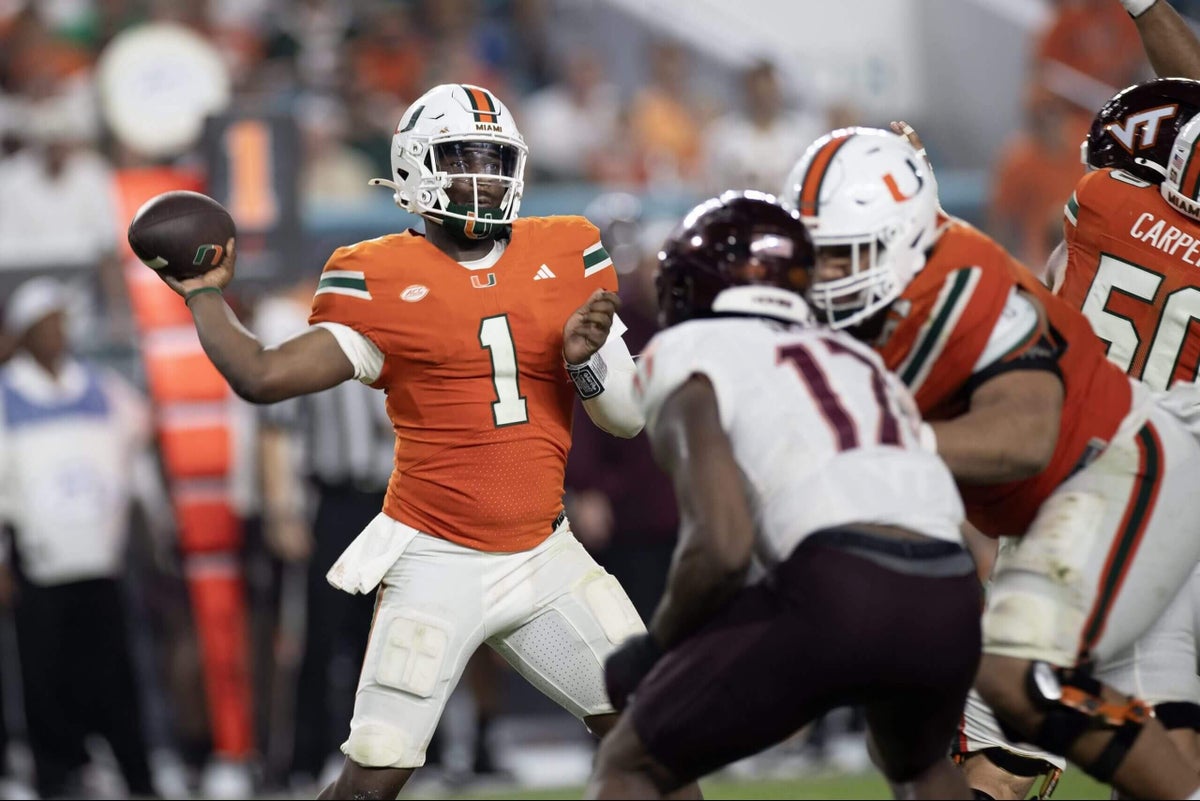Cam Ward and the Miami Hurricanes debuted at No. 4 on Tuesday night in the first installment of the College Football Playoff rankings.
It’s the first time the program has been ranked in the poll since the 2020 season and its highest ranking since checking in at No. 2 entering the final week of the 2017 regular season.
The Canes’ lofty ranking is not a surprise. Mario Cristobal’s team is 9-0, ranked fourth in the AP poll and one of only five remaining unbeatens in the FBS, along with Indiana, Oregon, BYU and Army.
If the Hurricanes win their last three regular-season games, they’ll play in the ACC Championship Game for the first time since 2017. Miami should be in great position with a 12-0 regular season to make the expanded 12-team Playoff even if it does not win the ACC title on Dec 7.
But what happens if Miami stumbles in one of its three final regular-season games, against Georgia Tech, Wake Forest or Syracuse?
What if the Canes don’t qualify for the ACC title game?
Let’s go over the scenarios.
How can Miami make the field?
Winning the ACC championship is the only way Miami — or any team in the league — guarantees itself a spot in the field. SEC and Big Ten teams will be in better shape to earn at-large berths due to strength of schedule.
Miami’s SOS ranks 65th, according to The Athletic’s Austin Mock. Its only win over a ranked opponent is at Louisville. SMU, which is also 5-0 in ACC play and on a collision course to meet the Hurricanes in Charlotte, is 2-1 against Top 25 teams with wins over Pittsburgh and Louisville. The Mustangs lost at home to Big 12 leader BYU, 18-15, earlier this season.
It’s hard to imagine a scenario in which Miami goes 12-0, loses the conference championship game to an 11-1 SMU team and does not make the field. But it feels a little less certain if Miami loses in the title game to a team that has two or three losses.
Still, the Hurricanes would have a lot going for them with a 12-0 regular season. Miami leads the country in scoring (47.4 points per game) and yards per play (7.71) and has a Heisman frontrunner in quarterback Cam Ward. Plus, the Canes have an impressive 24-point road win at rival Florida, which was giving SEC power Georgia all it could handle for three-plus quarters before the Bulldogs pulled away late.
How can Miami miss the field?
The easiest way for the selection committee to pass on the Hurricanes for an at-large berth is if they lose one or more of their final three regular-season games and do not even reach the league title game. That is still a possibility.
As it stands, Clemson (6-2, 5-1 ACC) and Pittsburgh (7-1, 3-1 ACC) are the only remaining ACC teams with one conference loss. The Panthers host the Tigers on Nov. 16, meaning only one of them has the potential to finish with only one league loss.
If Miami were to lose one of its last three games and finish tied with Clemson or Pittsburgh — and behind SMU — the first tiebreaker to determine who advances to Charlotte would be winning percentage against common opponents.
Miami and Pittsburgh’s common opponents are Louisville, Cal and Syracuse.
Miami and Clemson’s common opponents, meanwhile, are Florida State, Louisville, Virginia Tech and Wake Forest.
Why Miami still has a strong case
In the event Miami finishes 11-1 and does not play for the ACC championship, the selection committee will have to decide if it is still one of the 12 best teams in the country. You can make that argument regardless of the Hurricanes’ strength of schedule. Even though Miami’s defense is suspect, the team’s average scoring differential (24.8 points) is seventh-best nationally.
Yes, the Hurricanes have had to pull off three second-half rallies to beat Virginia Tech (5-4), Cal (4-4) and Duke (6-3). But could the selection committee really just gloss over some of the tight games other top-10 teams have played against mediocre opponents? There’s been too many to count.
Ultimately, in the event Miami is left out of its league title game and is battling for an at-large berth to the Playoff, it will need one or more of the other highly ranked one-loss teams — like Notre Dame, Penn State, Tennessee or Iowa State — to stumble at least once more down the stretch. Otherwise, it becomes a battle of comparing resumes.
We saw how that played out for the ACC last year.
(Photo of Cam Ward: Michael Pimentel / ISI Photos/Getty Images)

